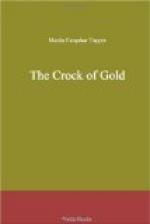“Why, what’s the matter now?” roared Ben; “one ’ud think we was bailiffs come to raise the rent, ’stead of son Tom and friendly Ben; hang it, mun, we aint here to cheat you out o’ summut—no, not out o’ peace o’ mind neither; so, if you don’t like luck, burn the fowls, or bury ’em, and let brave Tom risk limbo for nothing.”
“Oh, Ben!” murmured Grace, “why will you lead him astray? Oh, brother! brother! what have you done?” she said, sorrowfully.
“Miss Grace,”—her beauty always awed the poacher, and his rugged Caliban spirit bowed in reverence before her Ariel soul—“I wish I was as good as you, but can’t be: don’t condemn us, Grace; leastways, first hear me, and then say where’s the harm or sin on it. Twelve hundred head o’ game—I heard John Gorse, the keeper, tell it at the Jerry—twelve hundred head were shot at t’other day’s battew: Sir John—no blame to him for it—killed a couple o’ hundred to his own gun: and though they sent away a coachful, and gave to all who asked, and feasted themselves chuckfull, and fed the cats, and all, still a mound, like a haycock, o’ them fine fat fowl, rotted in a mass, and were flung upon the dungpit. Now, Miss Grace, that ere salt pea-porridge a’n’t nice, a’n’t wholesome; and, bless your pretty mouth, it ought to feed more sweetly. Look at Acton, isn’t he half-starved. Is Tom, brave boy, full o’ the fat o’ the land? Who made fowl, I should like to know, and us to eat ’em? And where’s the harm or sin in bringing down a bird? No, Miss, them ere beaks, dammem (beg humble pardon, Miss, indeed I won’t again) them ere justices, as they call themselves, makes hard laws to hedge about their own pleasures; and if the poor man starves, he starves; but if he stays his hunger with the free, wild birds of heaven, they prison him and punish him, and call him poacher.”
“Ben, those who make the laws, do so under God’s permission; and they who break man’s law, break His law.”
“Nonsense, child,”—suddenly said Roger; “hold your silly tongue. Do you mean to tell us, God’s law and man’s law are the same thing! No, Grace, I can’t stomach that; God makes right, and man makes might—riches go one way, and poor men’s wrong’s another. Money, money’s the great law-maker, and a full purse frees him that has it, while it turns the jailor’s key on the wretch that has it not: one of those wretches is the hopeless Roger Acton. Well, well,” he added, after a despondent sigh, “say no more about it all; that’s right, good-wife—why, they do look plump. And if I can’t stomach Grace’s text-talk there, I’m sure I can the birds; for I know what keeps crying cupboard lustily.”
It was a faint effort to be gay, and it only showed his gloom the denser. Truly, he has quite enough to make him sad; but this is an unhealthy sadness: the mists of mammon-worship, rising up, meet in the mid aether of his mind, these lowering clouds of discontent: and the seeming calamity, that should be but a trial to his faith, looks too likely to wreck it.




